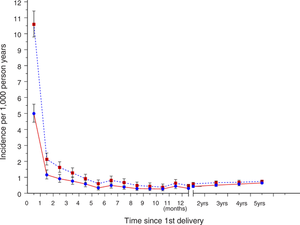Postpartum psychosis
| Postpartum psychosis | |
|---|---|
| Synonyms | puerperal psychosis |
 |
|
| Rates of psychoses among Swedish first-time mothers | |
| Classification and external resources | |
| Specialty | psychiatry |
| ICD-10 | F53.1 |
| ICD-9-CM | 648.4 |
Postpartum psychosis is a rare psychiatric emergency in which symptoms of high mood and racing thoughts (mania), depression, severe confusion, loss of inhibition, paranoia, hallucinations and delusions set in, beginning suddenly in the first two weeks after delivery. The symptoms vary and can change quickly. The most severe symptoms last from 2 to 12 weeks, and recovery takes 6 months to a year.
About half of women who experience it have no risk factors; but women with a prior history of mental illness, especially bipolar disorder, a history of prior episodes of postpartum psychosis, or a family history are at a higher risk. It is a not a formal diagnosis, but is widely used to describe a condition that appears to occur in about 1 in a 1000 pregnancies. It is different from postpartum depression and from maternity blues. It may be a form of bipolar disorder.
It often requires hospitalization, where treatment is antipsychotic medication, mood stabilizers, and, in cases of strong risk for suicide, electroconvulsive therapy. Women who have been hospitalized for a psychiatric condition immediately after delivery are at a much higher risk of suicide during the first year after delivery.
There is a need for further research into the causes and prevention; the lack of a formal diagnostic category and the difficulty of conducting clinical trials in pregnancy hinder research.
Postpartum psychosis is a psychiatric emergency related to care of women after they give birth. It is different from postpartum depression and from maternity blues.
The condition is not recognized in the DSM-5 nor in the ICD-10 but it is widely used clinically.
It may be a form of bipolar disorder.
Symptoms usually begin suddenly in the first two weeks after delivery. Symptoms vary and can change quickly, and can include high mood and racing thoughts (mania), depression, severe confusion, losing inhibitions, paranoia, hallucinations and delusions.
...
Wikipedia
